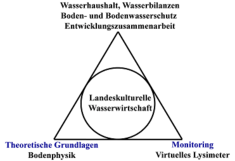Institute profile
Mission Statement
Our institute focuses on research of the water cycle where water interacts with soil. The aim is to optimize the sustainable use of the resources water and soil.
Research focus: Rural water management and soil physics
The term "rural water management" has evolved from rural water engineering in Austria and is now a key discipline of agricultural engineering and water management (Kulturtechnik und Wasserwirtschaft). It comprises the following terms:
- Land improvement (Landeskultur): All planning and acting to optimize the use of the natural potential and preserve it as a basis for life
- Water management (Wasserwirtschaft): Systematic management of surface and underground water reservoirs
Theoretical principles and measurements act as foundation for solving applied questions within the discipline. Thus, the meaning of rural water management can be expressed as a pyramid (see figure): Typical rural water management tasks can be derived from the pyramid plot. This includes assessment of risks related to land use, vulnerability of rural regions and its interactions with the conservations of soils and the soil water cycle. It also includes social aspects that emerge from a changing environment and that result in knowledge transfer – especially in development cooperation. Typical methods are lysimeters, the determination of soil and water balance parameters, monitoring of physical state variables in soils, sensor calibration and testing, and numerical and physical modelling and simulations. Our team has competences in the following disciplines: Water in soils, water in soil-plant-atmosphere-continuum (SPAC), soil and groundwater conservation, and rural water management in arid and semi-arid regions. By this, our institute contributes to the competence area "Water, Atmosphere and Environment" of the BOKU. We also cover the following topics:
- Soil erosion by wind and water
- Impact of the following boundary conditions on the use of agricultural and forest areas:
- changing environmental conditions, climate change
- Land set-aside, conservative soil management, regulation of the soil water balance (assessment of technical activities, cost-benefit analysis)
- ÖPUL constraints, validation of activities
- Impact of land use and soil management and its change on the soil water balance
- Transport processes in the vadose zone from the lysimeter to the field and catchment scale (scale challenge)
- Solute transport in the vadose zone and groundwater: Point source and diffusive inputs of nutrients and contaminants (e.g., nitrate, pesticides) in soils
- Monitoring of parameters and state variables of the soil water, experiments in the field and laboratory, measurement instrumentation, characterization of the spatial variability and derivation of effective parameters, numerical simulations
- Agricultural water management (irrigation, drainage): plant water demand, irrigation scheduling, economical assessment, conservation of agricultural drainage systems
Applied research on hydraulics
Together with the Institute of Water Management, Hydrology and Hydraulic Engineering, we operate a hydraulic engineering laboratory equipped with an experimental channel to analyze applied hydraulical problems. Examples are the determination of energy losses of tube or channel constructions, the behaviour of mineral oil in a separator, water inflow to a well in a strained aquifer, construction of efflux monitoring systems, or the designing of overfalls.
Teaching
Our institute covers the topics rural water management, soil physics, and hydraulics in the Bachelor and Master studies of agricultural engineering and water management. Besides, we also teach courses in the following master studies: Water Management and Environmental Engineering (WMEE), Natural Resources Management and Ecological Engineering (NARMEE), and Environmental Sciences – Soil, Water and Biodiversity (ENVEURO).

